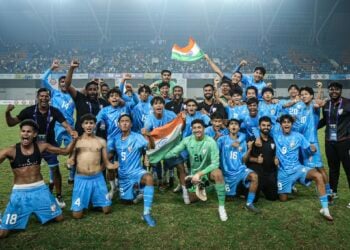The FC Barcelona vs Real Madrid Copa del Rey final faces an unprecedented crisis as Real Madrid threatens to boycott the showpiece event over a referee appointment. The Spanish giants have canceled all pre-match activities and publicly declared they may not participate in the final amid growing tensions over the selection of referee Ricardo de Burgos.
This latest development has thrown the prestigious barcelona vs real madrid rivalry into chaos. Consequently, the Spanish Football Federation (RFEF) now faces mounting pressure to address Real Madrid’s concerns while maintaining the integrity of the competition. The controversy erupted after Real Madrid officials held an emotional press conference questioning de Burgos’s appointment, citing previous incidents they believe demonstrate bias against their club.
Meanwhile, Barcelona has taken a different stance, publicly supporting the referees and calling for calm. Notably, Barça’s coach Hansi Flick has urged respect for officials despite the heightened emotions surrounding the fixture. The RFEF has already rejected Real Madrid’s formal request to change the referee, further escalating the standoff between the club and Spain’s football authorities.
If Real Madrid follows through with their boycott threat, it could have far-reaching consequences for Spanish football. The potential absence of one of Spain’s most storied clubs from the final would not only disappoint millions of fans but also raise serious questions about the governance of Spanish football.
Table of Contents
Real Madrid Cancels Pre-Final Activities Amid Referee Row
In a dramatic development on the eve of the barcelona vs real madrid copa del rey final, Real Madrid canceled all official pre-match commitments just hours before their scheduled activities. The club refused to participate in the pre-match press conference, training session at La Cartuja Stadium, and the official banquet organized by the Royal Spanish Football Federation (RFEF). Additionally, Real Madrid president Florentino Pérez and other senior executives boycotted the official gala dinner hosted by the RFEF.

Why Real Madrid Targeted Referee Ricardo de Burgos
The unprecedented boycott stems from Real Madrid’s objections to referee Ricardo de Burgos Bengoetxea’s appointment for the final. The day before the match, Real Madrid TV released a video highlighting what they claimed was “a series of errors made by De Burgos throughout his career”. This continues a pattern of criticism from the club’s television channel toward Spanish officials throughout the season.
Real Madrid formally requested the Spanish football federation remove de Burgos from refereeing duties, considering his position “untenable” after what they perceived as a conflict of interest. The club argued that the referee demonstrated “clear and manifest animosity and hostility against Real Madrid”.
According to sources close to the situation, Real Madrid saw the referee’s remarks as evidence of bias against one of the final’s participants. The tensions between Madrid and officiating authorities have been heightened by ongoing controversies, including the Negreira case involving Barcelona’s payments to a former refereeing committee vice-president.
How the Emotional Press Conference Escalated Tensions
What truly ignited the situation was an emotional press conference given by referee de Burgos Bengoetxea, during which he broke down in tears. The referee spoke about the personal impact of the criticism, stating: “When a child goes to school and people tell him his father is a thief it’s messed up”. His voice cracking with emotion, de Burgos added, “All I can do is educate my son so that he knows that his father is honorable”.
Pablo González Fuertes, the VAR official for the final, seated beside de Burgos, warned about the impact on young referees and suggested officials would “start taking real action”. He stated, “We are going to make history and we are not going to continue to put up with what we are putting up with”.
Following this press conference, Real Madrid released a strongly worded statement describing the referees’ remarks as “premeditated” and using a “threatening tone”. The club insisted the comments demonstrated “manifest hostility” toward Real Madrid and called on the RFEF to “act accordingly, adopting the relevant measures in defense of the institutions they represent”.
In response to growing speculation that they might not participate in the final, Real Madrid issued a clarification late Friday night: “Faced by the rumors that have emerged in the last few hours, Real Madrid wish to communicate that our team has never proposed renouncing playing in tomorrow’s final”. Nevertheless, the club maintained that the referees’ statements showed “hostility and animosity” against them.
The RFEF ultimately rejected Real Madrid’s request to change the referee appointment, insisting the game would proceed as scheduled with the original officiating team. This decision has created an atmosphere of unprecedented tension heading into one of Spanish football’s most prestigious matches.

Barcelona Supports Referees and Calls for Calm
In contrast to Real Madrid’s confrontational stance, Barcelona has taken a measured approach to the referee controversy surrounding the Barcelona vs Real Madrid copa del rey final. The Catalan club has publicly supported the officiating team and called for calm amid the growing tensions.
Hansi Flick Urges Respect for Officials
Barcelona manager Hansi Flick addressed the referee controversy head-on during his pre-match press conference on Friday, April 25. Rather than fueling the dispute, Flick emphasized the need to protect everyone involved in the game.
“For me, it’s only a sport. It’s only a game. It’s only football… It is our responsibility to protect not only the players but all the people involved in the game,” Flick stated firmly.
The German coach specifically highlighted the importance of referees in football and called for greater respect toward officiating decisions. “We need the referees,” Flick emphasized, “and we have to look after them and be careful”.
Flick expressed concern about the situation involving referee Ricardo de Burgos Bengoetxea, noting “It’s not nice that happened today”. He continued with a pointed remark about sportsmanship: “It’s not fair play not to look after them, it’s not showing them respect”.
To emphasize his position, Flick added: “Sometimes on the pitch there are some decisions that are about emotion, but after the match, we should be done with it. Something must be done” . Throughout his comments, he maintained that respect for officials remains fundamental to the sport’s integrity.
Indeed, Flick attempted to redirect focus back to the match itself, encouraging his young team to “enjoy the Final” despite the surrounding controversy. “We have a young team. It will be a great experience for a young group. There are no favorites in a final. We want to start well and fight for the title”.
Barcelona Players React to the Controversy
Barcelona defender Ronald Araujo echoed his manager’s respectful stance toward match officials when questioned about the controversy. “Being a referee is a very difficult job so we need to respect them and understand what they do,” Araujo stated diplomatically.
Specifically, Araujo revealed that Barcelona’s squad had not been discussing the referee situation internally, suggesting the team remained focused on the match itself rather than external controversies. “To be honest I haven’t seen it (referee’s comments and crying), they’ve told me I could get asked about this but we don’t talk about this in the squad” .
In fact, Araujo appeared more interested in praising his teammates’ mentality ahead of the high-stakes final. “I’m surprised by how incredible their mentality is,” the Barcelona captain remarked. “It’s as if we are not playing a final tomorrow, they are so calm” .
Particularly notable was Araujo’s admiration for Barcelona’s academy graduates: “Not just Cubarsi, Lamine, Fermin [Lopez], also [Hector] Fort, everyone… they’re incredible. The guys from La Masia are amazing, they have no fear” .
Even as tensions mounted between the clubs, Barcelona maintained their focus on preparation and performance for the barcelona vs real madrid copa del rey final, presenting a unified front of calm and respect for football’s institutions.

Spanish FA Rejects Real Madrid’s Request to Change Referee
After formal deliberation, the Spanish Football Federation (RFEF) officially rejected Real Madrid’s request to replace referee Ricardo de Burgos Bengoetxea for the barcelona vs real madrid copa del rey final. The federation remained firm on their decision, insisting the match would proceed as scheduled with the originally appointed officiating team.
What the RFEF Said About the Referee Appointment
RFEF President Rafael Louzan addressed the controversy directly, making the federation’s position unmistakably clear. “The CTA [Technical Committee of Referees] has appointed a refereeing team, and that’s the way it is,” Louzan stated firmly. He subsequently appealed for “calm, responsibility, and common sense” among all parties involved.
When journalists pressed about whether the high-profile barcelona vs real madrid match would proceed as planned, Louzan responded confidently: “Of course, yes.” The RFEF president confirmed he had already spoken with Real Madrid officials regarding the decision.
Although a source told ESPN that Madrid had formally requested a change in the refereeing team, the RFEF initially denied receiving such a request. Nonetheless, Louzan clarified the federation’s stance on the matter: “It’s a matter for [Spain’s Technical Committee of Referees], who have designated the referee and the VAR. So I won’t get into it.”
The federation categorically denied Real Madrid’s request, citing it as “unfeasible” to change the referee appointment at such a late stage. This position remained unchanged despite mounting pressure from the Madrid club.
How Real Madrid Responded to the Rejection
Following the RFEF’s firm rejection, Real Madrid issued a strongly worded official statement expressing their displeasure:
“Real Madrid CF considers the public statements made today by the referees appointed for the Copa del Rey final to be unacceptable. These remarks made in a premeditated manner, 24 hours before [kick-off and] against one of the participants in the final demonstrate, once again, a clear and manifest animosity and hostility against Real Madrid.”
The statement continued with a direct challenge to the federation: “Given the seriousness of what happened, Real Madrid expects the RFEF and the refereeing establishment to act accordingly, adopting the relevant measures in defense of the institutions that they represent.”
Eventually, amid growing speculation about a potential boycott, Real Madrid issued a clarification: “In light of the rumors that have emerged in recent hours, Real Madrid CF announces that our team has never considered withdrawing from tomorrow’s final.”
The club explained their decision to participate regardless of their grievances: “Our club understands that the unfortunate and inappropriate statements made by the referees designated for this match, made 24 hours before the final, cannot taint a sporting event of global significance that will be watched by hundreds of millions of people.”
Yet Real Madrid concluded their statement with a pointed remark: “Real Madrid believes that the values of football must prevail, despite the hostility and animosity that has been demonstrated once again today against our club by these referees appointed for the final.”

What Happens If Real Madrid Boycotts the Final?
Should Real Madrid follow through on their boycott threat for the barcelona vs real madrid copa del rey final, a series of predefined regulations would immediately take effect. The Spanish football governing body has clear protocols for such unprecedented situations.
Rules Governing Forfeits in Copa del Rey
According to Article 77 of the Royal Spanish Football Federation (RFEF) regulations, any team failing to appear for an official match or withdrawing from the competition faces automatic disqualification. The rules explicitly state that the forfeiting team loses the match immediately, with additional penalties triggered by their non-appearance.
These regulations exist to maintain competitive integrity and ensure clubs fulfill their obligations in official tournaments. For a high-profile event like the barcelona vs real madrid copa del rey final, these rules become especially significant given the global audience and commercial implications.
Potential Replacement by Real Sociedad
Perhaps the most striking consequence would be that Barcelona would not automatically receive the trophy. Instead, Article 80 of the RFEF’s Disciplinary Code stipulates that the final match would be rescheduled between Barcelona and Real Sociedad—the team Madrid eliminated in the semifinals.
This replacement mechanism exists because Real Sociedad was the last team defeated by Madrid en route to the final, having lost 5-4 on aggregate after an extra-time goal from Antonio Rudiger. Approximately 30,000 Madrid supporters have already arrived in Seville, creating additional logistical complexities should a replacement final be necessary.
Possible Ban from Next Season’s Tournament
The consequences for Real Madrid would extend beyond just this year’s competition. First, they would face an automatic ban from participating in next season’s Copa del Re . This penalty has precedent—Racing de Santander was excluded from the 2014-15 tournament after abandoning a match the previous season due to unpaid staff.
Additionally, Madrid would incur significant financial penalties, including fines ranging between €3,000 and €12,000 (approximately INR 253,141 to INR 1,096,945). The club might also face obligations to compensate third parties for damages resulting from their withdrawal.
Given these severe repercussions, Real Madrid ultimately confirmed they “never considered not playing in tomorrow’s final” despite their ongoing protest against the appointed officials.
How the Boycott Threat Impacts the Rivalry and the Final
The unprecedented boycott threat has cast a shadow over what is arguably football’s most storied rivalry, highlighting how the barcelona vs real madrid copa del rey final transcends mere sport. This potential no-show represents the most extreme manifestation of tensions in the competition’s history, fundamentally altering the pre-match atmosphere at La Cartuja Stadium.
Historical Tensions Between Real Madrid and Barcelona
El Clásico historically embodies Spain’s deep political divisions, with each club representing opposing ideologies. Real Madrid has traditionally symbolized Spanish nationalism and monarchical traditions, whereas Barcelona serves as a standard-bearer for Catalan identity and more liberal viewpoints. As one observer notes, “Real Madrid has always been seen as a symbol of Spanish pride and nationalism” .
This cultural divide explains why the referee controversy resonates beyond football. For Catalans, matches against Madrid represent “one of the few ways Catalans are able to fight and try to claim victory against the Spanish monarchy”. Henceforth, many Barcelona supporters view the current situation as merely the latest chapter in a continuing struggle for recognition.
The rivalry’s intensity has previously manifested in controversial incidents, including Luis Figo’s return to Camp Nou in 2000 being met with a shower of objects, most infamously a pig’s head. Moreover, José Mourinho’s eye-poking incident with Tito Vilanova in 2011 exemplifies how tensions can boil over .
Fan Reactions and Media Coverage
At the present time, approximately 30,000 Madrid supporters have already arrived in Seville , creating a powder-keg atmosphere. In effect, Spanish media has become sharply divided along club lines, with outlets close to Madrid amplifying the referee controversy while Barcelona-aligned publications emphasize respect for officials.
One commentator characterized Madrid’s approach as power politics: “He doesn’t complain, he threatens. He doesn’t protest, he punishes. He doesn’t want to improve football, he wants to own it”. Likewise, many neutral observers worry this controversy “risks not only tainting the reputation of a historic rivalry but also undermines the competition itself”.

Final Thoughts on an Unprecedented Football Crisis
The FC Barcelona vs Real Madrid copa del rey final controversy undoubtedly marks one of the most extraordinary chapters in Spanish football history. Real Madrid’s unprecedented threat to boycott the showpiece event fundamentally challenges the governance structures of Spanish football, while Barcelona’s measured response presents a stark contrast in institutional approaches.
Throughout this saga, the emotional press conference by referee Ricardo de Burgos Bengoetxea served as a flashpoint, subsequently escalating tensions between Real Madrid and football authorities to unprecedented levels. Most importantly, the RFEF’s firm rejection of Madrid’s demands has created a standoff with potentially far-reaching consequences for all involved.
Though Madrid ultimately confirmed their participation despite their grievances, this controversy nevertheless casts a long shadow over El Clásico’s storied legacy. Spanish football now faces serious questions about referee selection processes, club influence, and maintaining competitive integrity. Additionally, the divided media coverage highlights how deeply this rivalry penetrates Spanish society beyond mere sporting competition.
The regulations outlining severe penalties for boycotts—including replacement by Real Sociedad and competition bans—certainly played a role in Madrid’s final decision to participate. Regardless of the match outcome, this episode will likely prompt significant reflection among Spanish football authorities about balancing club concerns with officiating independence.
Football fans worldwide still eagerly anticipate whether the actual match will deliver drama equal to its controversial buildup. Ultimately, this extraordinary pre-match tension adds yet another remarkable chapter to what remains football’s most politically and culturally charged rivalry.








